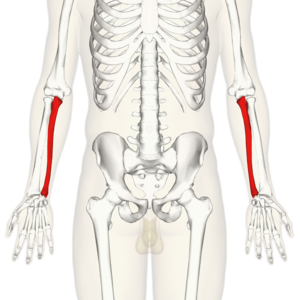Ulna
Original Editor
Top Contributors - Abbey Wright, Kim Jackson, Chrysolite Jyothi Kommu, Rishika Babburu and Joao Costa
Description[edit | edit source]
The ulna is one of two bones that make up the forearm, the other being the radius. It forms the elbow joint with the humerus and also articulates with the radius both proximally and distally. It is located in the medial forearm when the arm is in the anatomical position. It is the larger of the two forearm bones.[1]
Structure[edit | edit source]
The ulna is a long bone larger proximally than distally.
Proximal ulna[edit | edit source]
The proximal ulna is hook-like in form which articulates with the trochlea of the humerus to create the hinge joint of the elbow.[2]
The articulation is formed of the olecranon and the coronoid process.
Olecranon[edit | edit source]
This is a large, curved bony prominence which is accepted into the olecranon fossa, located on the humerus, during elbow extension.
Coronoid process[edit | edit source]
The coronoid process is a horizontal, bony projection
Function[edit | edit source]
Articulations[edit | edit source]
Triceps - attaches to the posterior of the olecranon process.[1]








